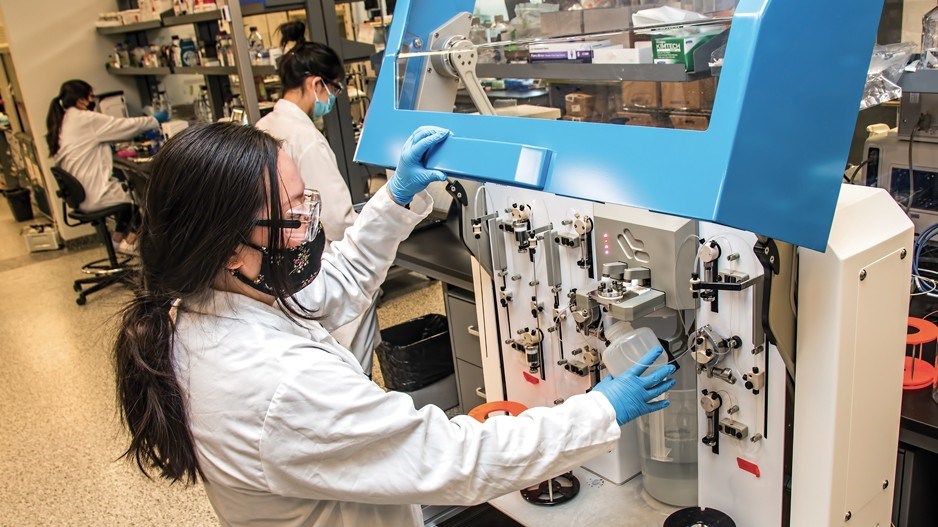Vancouver’s east side will serve as the site for a 75,000-square-foot facility capable of manufacturing both vaccines and biotech therapeutics.
Precision NanoSystems Inc.’s (PNI) revealed Wednesday its new headquarters and $50-million biomanufacturing facility, expected to be completed by the end of 2022, will sit on 1055 Vernon Dr. within the False Creek Flats area.
Founded in Vancouver, PNI is best known for producing technology to develop and manufacture genetics medicines that deliver RNA or DNA directly into cells to treat disease at its molecular root cause.
Last fall, Ottawa earmarked $18 million for the company to pursue its own COVID-19 vaccine, which is expected to enter Phase 1 of clinical trials shortly.
PNI specializes in a class of vaccines known as self-amplifying RNA vaccines. These have the potential to create more potent vaccines as they amplify the signal, allowing PNI to manufacture more doses for less volume.
Moderna Inc. (NYSE:MRNA) and Pfizer Inc. (NYSE:PFE) have been providing the bulk of Canada’s COVID-19 vaccine supply with their own messenger RNA (mRNA) vaccines.
PNI’s facility would be able to produce up to 240 million of its own self-amplifying RNA vaccine doses, compared with two million of the mRNA doses.
Plans for the specific site of the new head office and biomanufacturing plant come two months after U.S. innovation giant Danaher Corp. (NYSE:DHR) acquired PNI for an undisclosed amount.
“Together we'll be able to accomplish in two years what otherwise would take us five years, and in five years what would otherwise take us 20 years,” PNI co-founder and CEO PNI James Taylor told BIV at the time.
“[The acquisition] really allows us to bring together extremely complementary products and services to better serve our drug development partners and clients, expand our global reach, grow here in Vancouver and enable more drugs to be developed faster.”
His description of the acquisition as an accelerator pedal for the biotech’s ambitions already appears to be bearing out.
Taylor estimated earlier this year the biomanufacturing would be completed by March of 2023. That timeline has since moved up to the fourth quarter of 2022.
The federal government announced in February — prior to the June acquisition by Danaher — it was earmarking $25 million for the facility as part of a bid to shore up the country’s own domestic vaccine manufacturing capacity.
“There [were] obligations as part of that award and partnership with the Canadian government. So we're maintaining those obligations and now we've been able to attract a fantastic partner … to be a part of that as well,” said Taylor, who continues to lead PNI as subsidiary under Danaher’s life sciences division.
A botched deal last year between Canada and Chinese vaccine manufacturer CanSino Biologics Inc. laid bare the country’s vulnerabilities amid efforts to devise a proper immunization plan for COVID-19.
Faced with Canada’s limited vaccine manufacturing capacity, the federal government began putting $44 million into revamping a National Research Council of Canada facility in Montreal to ensure it could produce CanSino doses at home.
But with the collapse of the CanSino deal and Canada being slow to procure competing vaccines at the outset, the country’s immunization push has been entirely dependent on vaccines produced outside the country: Pfizer, Moderna and — to a much lesser degree — AstraZeneca plc.
The PNI biomanufacturing plant and the company’s own designs on self-amplifying RNA vaccines are part of the effort to change that moving forward.
Meanwhile, Vancouver-based AbCellera Biologics Inc. (Nasdaq:ABCL) announced in June it was set to further expand its footprint after selecting a site in the city’s east side for a manufacturing plant.
Its new 130,000-square-foot facility specializing in the production of therapeutic antibodies will sit on the 900-block of Evans Avenue — about a five-minute drive from PNI’s new site.
AbCellera’s 380,000-square-foot headquarters is also under construction three kilometres west in the city’s Mount Pleasant neighbourhood.
AbCellera, best known for specializing in antibody discovery and partnering up with American pharmaceutical giant Eli Lilly and Co. (NYSE:LLY) on a COVID-19 treatment, raised US$555 million through a blockbuster initial public offering in December 2020.
Its new facility is being funded in part by a grant from the federal government’s Strategic Innovation Fund (SIF).
In May 2020, Ottawa earmarked $175.6 million from the SIF to AbCellera to bolster the country’s response to future pandemics both through the company’s existing drug discovery technology as well as the development of a manufacturing facility.
The deal struck with the federal government will see AbCellera match the SIF funding dollar for dollar.
“It's still early in the design process at this stage, but we think that the [building] costs are likely to run in the $230 million to $250 million range when it's fully operational,” Murray McCutcheon, AbCellera’s vice-president of corporate development, told BIV in June.
“We know that we have grounds to make up in terms of biomanufacturing nationally, and we're incredibly excited to partner with the Government of Canada in the development of this facility and help us respond faster next time.”




